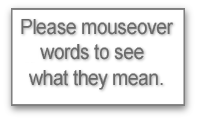James Bendle - layers of sediment
21-January-2010
Layers of sediment transcript
You have creatures living in the sunlit upper ocean. They die. They fall down through the ocean. Then you get slow accumulation of ocean sediment over millions of years, building up like a layer cake. Each layer reflects the climatic conditions at the time the creatures were living.
It's like a layer cake as long as in that area it has remained undisturbed. So there are some areas of ocean floor where you have mass movements, the under-ocean equivalent of landslides. In areas like that the sediment has been disturbed.
But large parts of the ocean floor are relatively quiet and undisturbed. In those areas there's been the gradual accumulation, layer by layer, every year for thousands up to 150 million years of sedimentation.
The oldest parts of the ocean crust are about 150 million years old. So we can study climate change on geological timescales by looking at ocean sediments.
Time machine
The fundamental concept is that as the layers of ocean have been accumulating, they consist of all sorts of material – dust that's blown out to the ocean, material transported by icebergs or sea ice and dropped onto the ocean floor.
But a lot of the material that just looks like mud is in fact microfossils and organic, detrital remains of planktonic creatures – algae and little zooplankton that feed on the algae. They all live in the sunlit upper layers of the ocean. They die and their remains sink in a kind of marine snowfall to the bottom of the ocean and you get a layer of mud accumulating.
So the idea is that we can go back. It's kind of like a time-machine. We start from the surface of the ocean and drill down through the ocean floor, through these layers of sediment.
We get to different layers of sediment and look at the remains of past creatures, and the material in that layer. That tells us something about conditions at the ocean surface at the time that layer accumulated.
More help with words
| average | fossils | crustacean |
